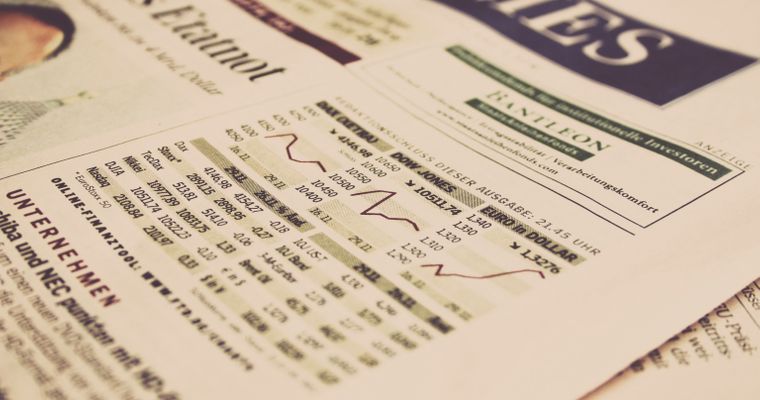(photo credit: Photo by Markus Spiske on Unsplash
Listen to this article (5 minutes)
On Friday, January 22, 2021, GameStop (GME) briefly halted trading. Now, while trading halts are not altogether uncommon, this particular trading halt came as a result of an estimated +69% intraday price spike that was, in part, due to a very strange situation.
To really tell the story of the Battle of Little Round Stop (see what I did there), we need to start back in August, 2020
On August 3, 2020, GameStop was trading at $4.15/share, with around 2.5MM shares traded that day... down from a high of $33.48/share on April 27, 2016. Over the past 3-5 years, GameStop had largely been viewed as a dark horse - similar to Blockbuster, GameStop was opined to be selling physical goods in a digital world, a paradigm shift that killed companies from the aforementioned Blockbuster to companies like Borders.
Some History
That being said, not everyone viewed GameStop as one of the last of a dying breed - On August 19, 2019, Dr. Michael Burry (head of Scion Capital and... well, the Big Short guy) issued a press release urging GameStop to issue a share buyback of ~300MM$, in order to "...create(s) the opportunity to enter 2020 with a dramatically reduced share count along with multi-fold greater impact per share for every single other achievement of management..." Essentially, Michael Burry was asking GameStop to consolidate their outstanding shares to reduce price volatility (since at that point around ~63% of GameStop shares had short interest) and magnify the impact of the next video game console cycle (PS5/Xbox X, of which both had been set to release at the end of 2020).
Now earlier that year, in April 2019, GameStop had brought in a new chief executive - George Sherman, of Best Buy stock. Sherman's focus seemed to be growing GameStops e-commerce business, which he accomplished with rousing success, seeing a 500% YoY e-commerce revenue grown in Q1 2020, and an 800% YoY e-commerce revenue growth in Q2 2020.
Sherman's leadership didn't go unnoticed in the wider market - in December of 2020, Ryan Cohen (of Chewy fame), purchased 9MM Gamestop shares in a $76MM deal. Despite Sherman's experience in e-commerce growth, however, Cohen believed the company could be even more aggressive in driving changes to grow their e-commerce business.
In a press release from RC Ventures, LLC (the holding company for Cohen's GameStop investment), Cohen recommended the following imperative strategies (direct quote):
- Forgo the upcoming 2-year lease renewal on all underperforming stores
- Non-core operations in Europe and Australia to be streamlined or sold.
- By cutting cost with the above two methods and with the revenue generated from the biggest ever console cycle, GameStop should invest heavily on boosting E-comm sales.
And essentially demanded that GameStop lay out the company's roadmap during the December 2020 earnings call to basically drastically increase investment in e-commerce talent acquisition and digital transformation.
The Reddit Angle
Now this investor interest and renewed focus on e-commerce was not lost on the citizens of financial forums across the internet... one of the most prominent, of course, being /r/wallstreetbets, a massively popular subreddit who describes themselves as "Like 4chan found a Bloomberg Terminal". (For those that don't know, essentially, WSB is a subreddit where alpha enthusiasts talk trading strategies, share war stories, and work together to discover market opportunities that day traders could profit from.)
Needless to say, GameStop had not gone unnoticed by members of wallstreetbets - one user in particular, with the username user u/DeepFuckingValue/, seemed to be substantially betting on GME as early as April of 2020 (one enthusiastic post estimates that DeepFuckingValue now owns 0.2% of GameStop). And DeepFuckingValue wasn't the only one - soon, GME became, well, a meme... even making it to the front page of Reddit several times.
WSB vs. the world
As is the case with every epic finance story, there has to be some conflict. As such, alluding to WSB as Scott Pilgrim allows us to make a play on "Scott Pilgrim vs. The world" (because, well, pop culture?). Here, "the world" starts with Citron Research. Headed by Andrew Left, Citron Research, a financial newsletter that reports on companies that Left believes to be overvalued or fraudulent in some fashion. You can see where this is going - Left believed that GameStop was overvalued, and some people got kind of mad... so they said mean things on Twitter and then went about their business.
Sadly, that last bit was a lie - in actual fact, Left claims that Citron Research's Twitter was hacked multiple times, and that his short selling fund Citron Capital divested its short position on GameStop due to "harassment from bulls".
Citron wasn't the only institutional investor with a substantial short position in GameStop - hedge funds like Melvin Capital (among others), who had a short position on 5.5MM shares going into 2021, has announced that it closed it's GameStop position, substantially contributing to it's ~$2BB in losses (the fund is down 15%) in January 2021.
This dynamic has almost turned into a David and Goliath story, with institutional investors crying foul and claiming market manipulation, and WSB members alluding to institutional traders flouting common sense and, well, getting caught with their pants down.
Oh, and WSB made a song about the situation:
The Tendieman - Lyrics and video by u/quigonshin from wallstreetbets
The Short Squeeze
GameStop's stock, in its current state, is entering into short squeeze territory. A short squeeze is a rapid increase in the price of a stock owing primarily to technical factors in the market rather than underlying fundamentals... essentially saying that GameStop's stock price has skyrocketed 1500% in the past 9 months not entirely due to the company fundamentals, but rather due to large over-exposed short positions held by institutional investors.
What the hell is an over-exposed short position? Essentially, in this case, institutional investors shorted more GME than the stock's float, or the number of shares available for trading of a particular stock. Essentially, in this case, institutional investors had outstanding contracts to sell more shares of GME stock than was currently available for trading. (Remember that press release from Michael Burry wayyyyy back in 2019 urging GameStop to buy back a massive quantity of stock?)
Basically, a short position is an option known as a put contract, and is a bet that a stock's value will go down... so an investor can purchase a contract that empowers them to sell a stock at a fixed, agreed-upon price to a buyer at a later date. The idea is that, if you purchase a contract to sell a stock at 10$, and the trading price of that stock goes to 1$ one month later, you can buy shares of the stock at 1$, and turn around and immediately sell them to the buyer at the sale price of the contract - in this case, 10$ a share.
Institutional investors in this case got a little greedy - there was so much confidence that GameStop was a dying company that institutional investors basically gorged themselves on put contracts, thinking that GameStop shares would be so dirt cheap when their options were near expiring that they'd make a massive gain when the options were exercised.
However, popular investor interest started driving up retail investor long positions in a big way. The opposite of a short position, a long position is a bet that a company's stock price will increase. A long position an be as simple as buying a share of the stock (with the intention of selling it at a later date for a profit), or can get more complex with call options, which is a contract that allows an investor to buy a stock at a fixed price at a later date (the idea being that, if a stock price goes up to 10$, you'll be able to buy that stock for 1$ and immediately sell it to the open market for a 9$ profit).
So, now institutional traders are panicking... essentially, there is a huge demand for GameStop stocks (since there are so many unfilled short positions) and limited supply of stock (since so many people are opening long positions in GME), leading to an increase in stock price, and drastically reducing if not completely zero-ing the value of the outstanding short positions.
What's next
As of this writing, GameStop stock is flying high at $65.01 a share. What remains to be seen is how this short squeeze situation plays out, but one thing is certain... organized crowdsourcing of retail investors can move markets.


Comments